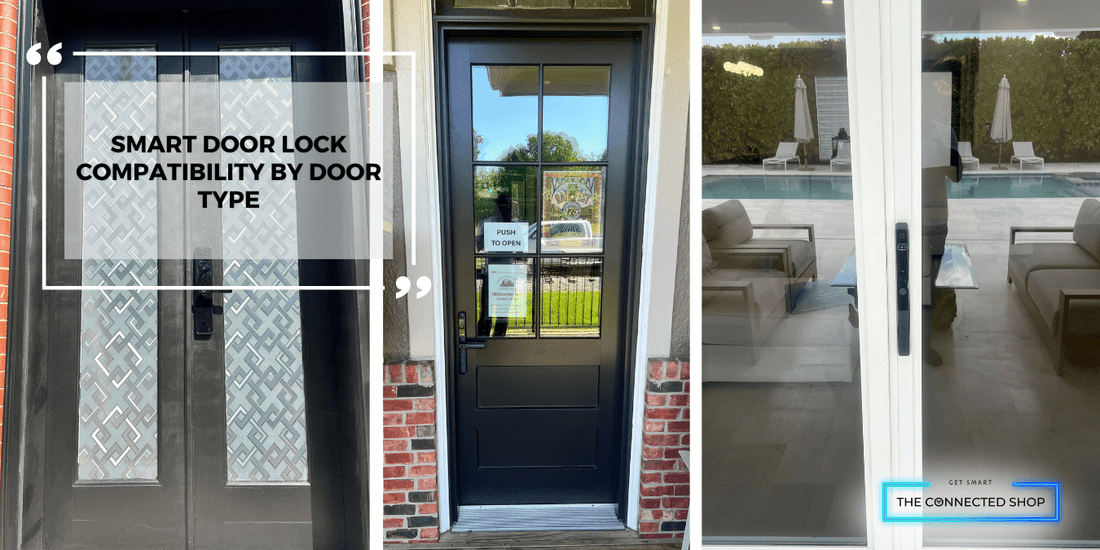When it comes to upgrading your entryway with smart door locks, one size doesn’t fit all. The type of door you have whether it's sliding, French, multipoint, narrow stile, or a traditional single-panel plays a critical role in determining which lock will work best. Choosing the right fit isn’t just about convenience or design; it’s about ensuring functionality, security, and a smooth installation process.
In this guide, we break down how different door styles influence your smart door lock options, what to consider before purchasing, and which models offer the best compatibility. Whether you're securing a storefront, a patio door, or a front entrance, making a smart choice starts with understanding your door.
Understanding Your Door: Why Type and Structure Matter for Smart Door Locks
Before investing in smart door locks, it's essential to understand how your door’s design influences compatibility. While smart door locks offer advanced features like remote access, passcodes, and biometric entry, they still rely on proper mechanical alignment with your existing door system.
Door Types and Why They Matter
Single-Panel Doors: These are the most straightforward when it comes to smart door lock compatibility. Many standard models are designed to work with this configuration and can be installed with minimal adjustments.
Sliding Doors: Requiring specialized locks that work without traditional deadbolts, sliding doors often need smart door locks designed for lateral movement, usually mounted on the surface with alternative locking mechanisms.
French and Double Doors: These often use inactive panels and may require additional accessories or locks that align with multipoint or flush bolt systems.
Multipoint Doors: Common in premium residential and commercial settings, multipoint doors lock at the top, middle, and bottom. These require smart door locks built to engage all locking points, standard single-deadbolt locks won’t suffice.
Narrow Stile and Commercial Glass Doors: These doors typically feature slim aluminum frames or glass panels, limiting space for traditional locks. Slim-profile smart door locks are essential to maintain both function and aesthetic integrity.
Structural Details That Impact Fit
Door Thickness: Not all smart door locks accommodate thicker or thinner doors. Make sure to review the lock’s compatibility guidelines to ensure it fits your door’s dimensions and requirements.
Backset and Mortise Requirements: Some doors have a mortise lock system built in, while others rely on surface-mounted locks. Knowing which applies helps guide your selection.
Hinged vs. Sliding Function: The physical mechanics of how a door opens affect how a smart lock should be installed and accessed.
Choosing the wrong type of lock can result in poor alignment, failed functionality, or the need for costly modifications. By identifying your door type and structure early, you set the foundation for a seamless and secure smart door lock upgrade.
Best Smart Door Locks for Each Door Type: Model Recommendations That Work
There’s no one-size-fits-all when it comes to smart door locks, but some pairings just make sense. The examples below highlight some of the most common combinations we recommend, based on fit, function, and overall ease. Of course, if you have a unique setup or specific features in mind, there are plenty of other great options too.
Here are a few go-to picks to help you get started:
Single-Panel Doors
The Smart Door Lock is a versatile and compact choice, perfect for standard front or interior doors. It delivers secure keyless access through fingerprint, passcode, or app control and is simple to install without structural modifications.
Sliding Doors
For sliding setups, the Next Gen Smart Lock is a strong match. With facial recognition, remote app control, and a sleek profile, it’s ideal for patio or balcony doors that require a side-mounted locking solution.
Multipoint Doors
The Smart Door Lock Slim is well-suited for multipoint doors. It’s built to engage top, middle, and bottom locking points, making it a reliable choice for both residential and commercial entry doors that demand enhanced security.
French and Double Doors
The Smart Door Lock Slim also works especially well here. Its slim profile fits the tight space between panels and aligns with the multipoint hardware often found in French door configurations.
Narrow Stile / Glass Commercial Doors
The Next Gen Smart Lock and Smart Door Lock Slim are both excellent choices for narrow aluminum-framed or glass commercial doors. The Next Gen offers advanced features like facial recognition and remote control, while both models maintain a clean, minimal footprint that fits tight spaces without compromising on security.
No matter the door type, it’s always a good idea to double-check the product specifications to make sure everything lines up with your door’s dimensions and hardware.
Final Check: What to Consider Before You Buy a Smart Door Lock
Before you commit to a smart door lock, taking a few extra minutes to check key details can save you time, hassle, and unnecessary returns. Whether you're upgrading a residential front door or securing a commercial glass entry, here’s what to keep in mind:
Door Measurements
Confirm your door’s thickness, backset, and handing (left or right swing). These measurements affect whether a lock will physically fit and function properly.
Know Your Lock Type
Are you replacing a standard deadbolt, a mortise system, or a multipoint setup? Matching your smart door lock to your existing hardware ensures smoother installation.
Decide on Your Access Methods
Whether you prefer fingerprint access, passcodes, facial recognition, or remote unlocking via app, choose a lock that supports the methods that fit your routine best.
Plan for Installation
Some locks are easy to install with basic tools, while others, especially those for multipoint or glass doors are best handled by a professional locksmith. Know your comfort level and timeline.
Check Smart Home Compatibility
If you use Alexa, Google Assistant, or another smart home system, make sure your chosen lock integrates with it for seamless voice control and automation.
Match the Aesthetic
A smart door lock should complement your door, not clash with it. Choose a finish and design that blends with your hardware and architecture especially important for modern or narrow stile doors.
Taking these factors into account ensures that the smart door locks you choose aren't just functional, it’s the right fit for your lifestyle, your space, and your security goals.
Final Thoughts
Choosing the right smart door lock starts with understanding your door. From sliding glass to narrow stile aluminum, each door type has its own set of requirements and your smart door lock should be built to meet them. By considering both the structure of your door and the features that matter most to you, you can ensure a secure, seamless upgrade that blends function with style.
Whether you're prioritizing advanced access methods like facial recognition or simply looking for a clean, secure solution that works with your existing hardware, the right fit is out there. Take the time to measure, check compatibility, and choose a model that suits your entryway. When you match your smart door lock to your door’s design, you’re not just investing in convenience, you're building smarter security from the start.






